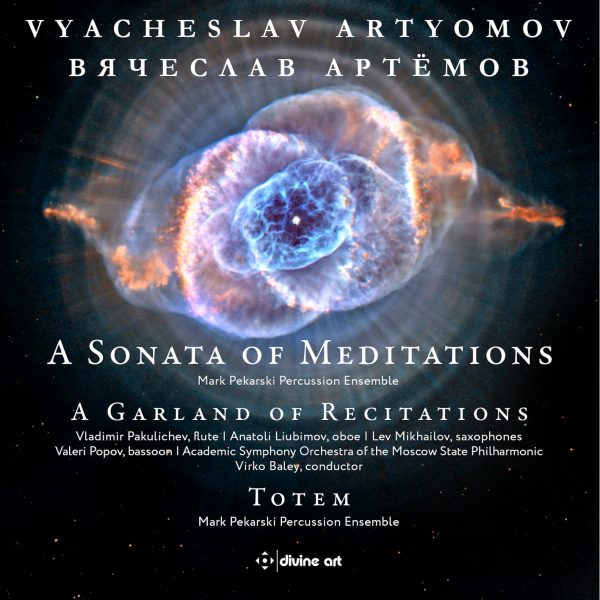Fanfare
As with earlier Divine Art discs of music by Vyacheslav Artyomov (b.1940), these are not new recordings. All have been licensed from Melodiya and all were recorded in the 1980s and 1990s.
Artyomov’s music has polarized our reviewers. I have liked several of his works.
This disc is devoted to music that Artyomov composed in the 1970s. He has composed a number of works for percussion ensemble, with or without other musicians, and two such works are on this CD. A Sonata of Meditations is in four sections, and each section represents a different time of day: “Morning,” “Afternoon,” “Evening,” and “Midnight.” The work is scored for four percussionists: one in the first section, two in the second, and so on. Each section also has a different sound, as a result of the different types of percussion instruments that are used. “Morning” uses only metallic instruments, for example, while “Afternoon” uses only drums. In this way, Artyomov has created ample contrast within this 28-minute work. The composer called it “a musical expression of the spirit of a human being aware of his responsibility to the world and absorbed in his daily round of meditations on the world’s beauty, on the profound significance of creation.” That’s a pretty tall order, and I am not sure the music delivers it. Nevertheless, Artyomov’s fondness for mystery and ritual is evident throughout, and the sounds are intriguing. That said, the Sonata really sounds like a product of its decade, for better or worse, and some listeners, feeling deja vu, might push it aside in boredom.
Totem, a work for six percussion players who play 69 instruments, was inspired, in part, by Varese’s Ionisation. You will discern that very quickly if you know that particular work. This time, the composer has written that Varese “really was the first contemporary composer to choose percussion as a medium for the expression of deep tragic experience.” Suffice it to say that I would like to hear Artyomov explain what he means by that. Totem is in one movement with three sections, and is more structurally and rhythmically complex than the Sonata, but again, it sounds its age. Both performances, by musicians from the Mark Pekarsky Percussion Ensemble, sound good to me, and the engineering is fine.
For me, the standout work on the disc is the 29-minute A Garland of Recitations. Suspended over an ominously roiling stratum of divided strings (Ligeti’s Lontano or Atmospheres come to mind), four wind instruments take turns unfolding long solos, which really do sound like recitations. The music seems to dwell in a land before the dawn of history, and the soloists sound like four ancient sages imparting wisdom and warnings in languages that are long dead. I’m really not sure what it all means, but this work definitely held my attention, and the soloists, in particular, give the music their all.
@divineartrecordingsgroup
A First Inversion Company
Registered Office:
176-178 Pontefract Road, Cudworth, Barnsley S72 8BE
+44 1226 596703
Fort Worth, TX 76110
+1.682.233.4978












